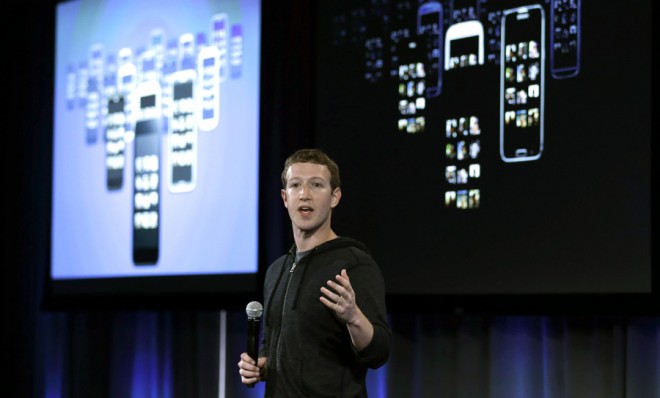How Facebook could end: Not with a bang, but an unbundle
Could Facebook be going the way of newspapers?

A free daily email with the biggest news stories of the day – and the best features from TheWeek.com
You are now subscribed
Your newsletter sign-up was successful
"Mobile devices are doing to web services what web services did to print media," argues Union Square Ventures partner Albert Wenger: "They unbundle."
For decades, newspapers have been made up of different sections — arts, sports, business, etc — that show up bundled on your doorstep each day. You may not have needed or liked each individual section, but you got them all because the whole package was the only way to get the parts you liked. Then the internet came along and untied those knots, making it easier to switch from the Drudge Report for politics to Grantland for sports than it was to go from Styles to Op-Eds within the same paper. And you could selectively "subscribe" to the free web sections that you liked while ignoring the entire package.
Now, Wenger and others in the venture cap smart set contend that the same process is afoot in your phone. Especially with Facebook.
The Week
Escape your echo chamber. Get the facts behind the news, plus analysis from multiple perspectives.

Sign up for The Week's Free Newsletters
From our morning news briefing to a weekly Good News Newsletter, get the best of The Week delivered directly to your inbox.
From our morning news briefing to a weekly Good News Newsletter, get the best of The Week delivered directly to your inbox.
Smartphones now account for 61 percent of American mobile devices, and with the move from the keyboard to the thumb, user experience is undergoing a fundamental shift, says Fred Wilson, a colleague of Wenger's at Union Square.
Web services like Facebook are particularly unsuited to the change — if you're one of the nearly 500 million users of Facebook's main mobile app, you already know the experience feels crowded; the cluttered desktop experience is downright claustrophobic when held in your hand. There are so many services built into this one product — and you probably need only a sliver of them. The danger for Facebook is that each individual service can be better provided by a smaller competitor — meaning you don't have to use Facebook at all.
"It is just as much effort to go to another part of the Facebook (mobile) app as there is to go to a different app altogether," Albert Wenger notes. "Facebook for mobile may not be Facebook at all but rather a combination of, say, Instagram, Kik, Twitter, Foursquare, and others."
In becoming unbundled, Facebook is slowly being disrupted. Disruption means that if another company better or more cheaply delivers the value you create for your users, you’ll be shuttering your (e-)windows. It's what Netflix did to Blockbuster. Facebook, in becoming a many-tentacled social network experience, creates many values, each of which are being displaced by younger companies.
A free daily email with the biggest news stories of the day – and the best features from TheWeek.com
The question, then, is which products are better creating that value. As Redpoint VC Tomasz Tunguz noted on his blog, the unbundling comes in many ways. For messaging, WhatsApp, now has more users globally than Twitter, while apps like Path and Couple are better for more intimate relationships. SnapChat is the service of choice for college students (and, weirdly, Wall Street bros).
So how is Facebook reacting to the shift to mobile, which its IPO amendments famously handwaved over? In the same way that Apple "disrupted" its own iPod business by introducing the iPhone, Facebook is, at least to some degree, attempting to unbundle itself: Its like-heavy Messenger app operates as a standalone, as does its quizzically redundant Camera. And of course, there's its decision to acquire Instagram.
Still, the bundle could survive as long as it evolves: As Jonathan Libov notes, big businesses like Facebook can build services around their core product — those satellite apps circling the Facebook App — to "maximize retention and engagement," so that those secondary services become "accessories."
The biggest bid at that app-y solar system is Facebook Home, the unpopular home screen operating system that COO Sheryl Sandberg recently defended, stating that the social network is "getting the feedback" about how power users dig it while others abhor how the app takes over your whole phone experience.
Still, having your mobile life rotate around Facebook may reveal issues needing an altogether different unbundling.
"Yet Facebook Home's failure probably has little to do with how the thing works," Jonathan Libov quipped. "I think it's actually more fundamental than that: Facebook Home is just too narcissistic for even your average social-media loving narcissist."
Drake Baer is an independent journalist living in Brooklyn. His work has appeared on FastCompany.com, the Daily Beast, Paste, Lifehacker, and elsewhere.
-
 The Olympic timekeepers keeping the Games on track
The Olympic timekeepers keeping the Games on trackUnder the Radar Swiss watchmaking giant Omega has been at the finish line of every Olympic Games for nearly 100 years
-
 Will increasing tensions with Iran boil over into war?
Will increasing tensions with Iran boil over into war?Today’s Big Question President Donald Trump has recently been threatening the country
-
 Corruption: The spy sheikh and the president
Corruption: The spy sheikh and the presidentFeature Trump is at the center of another scandal